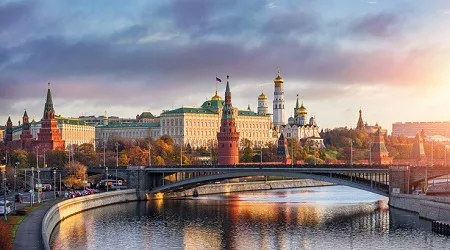Russia is developing cryptocurrency as a weapon for economic warfare

An economic weapon like cryptocurrency is too good for Russia to pass up – as it has openly said.
OPINION: News recently broke of Russia's involvement in the creation of Venezuela's Petro, the world's first national cryptocurrency.
Russia's apparent involvement in it might serve two goals. The first is to open another front in its unambiguous efforts to fight back against US economic dominance and to look for ways around the sanctions that have been weighing on Russia's economy since its 2014 Ukraine invasion. The second is to use Venezuela as a crash test dummy for Russia's own national cryptocurrency.
"The reign of the dollar must end," said Andrei Kostin, head of Russia's state-controlled VTB bank in a recent speech. "This whip that the Americans use in the form of the dollar would then, to a great extent, not have such a serious impact on the global financial system."
It's important to understand that the US dollar is the de facto global currency for international banking and is the weightiest of the three global reserve currencies. These are the currency reserves that serve as the mediums of exchange for most international transfers. The US dollar was the obvious choice in the 50s, thanks to its post-war economic dominance, while the euro became the second one in 1999 and the Chinese yuan became the third one in 2016.
Today, the US dollar is still the most globally dominant of the three by a large margin, and when money is transferred, it will often be converted to US dollars first and then into the recipient currency. This goes a long way towards propping up the US dollar's value and gives the United States a lot of leverage over global sanctions and financial enforcement. This is because international sanctions are enforced on countries through their banks, and large banks worldwide are still heavily dependent on US dollars.
Russia aims to erode this economic pillar in order to weaken the United State's overall economic strength and limit its ability to effectively enforce sanctions. Its efforts to date have been a bit of an ongoing scattershot. For example, by pushing ruble-yuan swaps in order to "reduce Russia's [and China's] dependency on the US dollar."
But it's now clear that Russia's strategy for the future is crystallising around cryptocurrencies, and that the creation of the Petro was an important experimental step in Russia's movements towards cryptocurrencies.
As Putin himself said, "The Stone Age didn't end due to a lack of stones, but because new technologies appeared. Those late in this race will instantly, VERY FAST, be fully dependent on the leaders of these processes." (Translation edited for clarity).
The bloc chain.
TIME reports that Russia has been examining the potential of a digital ruble, but has faced resistance from Russia's central bank, which is concerned about the risk of destabilising the fiat ruble. Rather than jumping in feet first, Russia used Venezuela as a guinea pig to trial the idea of an asset-backed (in this case, oil) cryptocurrency.
By all accounts, it was an educational trial.
Shortly after the creation of the Petro, Russian news agency Interfax reported on a letter Putin received from his finance minister, obliquely detailing some of the Petro's hits and misses and giving some insights into what exactly Russia's looking for in an official cryptocurrency. It highlights the unwanted risks of backing an official cryptocurrency with public funds, such as state-owned assets, which were distinct features of the Petro launch.
It also raised the issue of Russian cryptocurrency traders being banned from various international cryptocurrency exchanges that didn't want to unintentionally fall afoul of US sanctions, and the unresolved scaling problems that remain at the centre of bitcoin and Ethereum.
"In view of the foregoing, it seems that the creation of a national crypto currency with a single emission center [Russia] is impossible," the letter concludes.
This might explain Russia's enthusiasm for multinational cryptocurrencies. It has previously proposed and pushed for a BRICS (Brazil, Russia, India, China and South Africa) multi-national cryptocurrency, but the idea may have fallen apart in the face of hesitation from the other countries that might be much less enthusiastic about stepping on the United States' toes.
However, several other countries that are facing US sanctions are also examining their own national cryptocurrencies, and it probably wouldn't be too surprising to find the Kremlin's fingerprints on them either.
Russia is keenly aware of the economic advantages awarded to the countries lucky enough to control the de facto global currencies, and right now, its goals are to remove the US dollar from its pedestal and to try to insert itself however possible.
The cryptocurrency revolution is a once-in-a-lifetime opportunity to change this status quo, and Putin aims to take full advantage.
A sensible strategy
The defining feature of cryptocurrencies is their ability to move money outside established banking networks and without necessarily needing to be converted to any other currency at all. Typical fiat currency transfers like rubles and US dollars are easily traceable unless they're hard cash, can only pass through a handful of specific corridors and will typically need to be converted en route. It's slow, messy, expensive and covered with fingerprints, especially for large amounts of money.
Cryptocurrencies can be moved almost instantly and in many cases without leaving any traces, while their decentralised networks mean it's not possible to shut them down by kicking in doors or making arrests – or even by bombing large swaths of land if it comes to that.
It's safe to say that cryptocurrencies are already being widely used on an institutional and national level to escape sanctions, simply because anyone who isn't doing so has really dropped the ball. It's also safe to say that you won't hear about it because the transactions are almost entirely invisible, and it's not possible to say with any certainty that they're actually happening even though they definitely are.
For example North Korea has been mining as much Monero as possible and it certainly isn't being spent on the streets of Pyongyang. It's almost certainly being moved overseas. More significantly, it's extremely easy to do, impossible to prevent and impossible to say exactly how much is being transferred.
The main downside is that Monero isn't good for much except dark-web purchases. Fortunately for smugglers, it can be seamlessly and anonymously traded for more widely accepted currencies like bitcoin on services like ShapeShift, which can then be more easily sold for cold hard cash in the destination country.
The two-fold approach
TIME reports that US authorities have been watching closely, perhaps only mildly hindered by President Trump's awkward personal financial ties and unwavering support for Russia. But overall, they might be unconcerned.
"The Russians just love to poke holes wherever they can, and they poke a lot of holes, or they try to," said Brian O’Toole, who worked at the U.S. Treasury Department until 2017, to TIME. But cryptocurrency only lets them "nibble around the edges" by allowing some sanctioned officials or businessmen to move their wealth abroad without fear of US seizure.
National cryptocurrencies are still in the fetal stage, while public cryptocurrencies like bitcoin are in their infancy. They might be enough to act as a full-blown lifeline for North Korea, but probably can't effectively service more than a handful of oligarchs in Russia yet.
But in the longer run, this seems likely to change.
"If more people start using this type of digital cash, and more businesses accept it as a form of payment, trade in cryptocurrencies could ultimately grow large enough to rival major currencies like the dollar," TIME says. "That is what many investors in this field are banking on."
With the enthusiastic support of entire countries, this bet probably isn't as far-fetched as it might seem.
If nothing else, Russia's enthusiasm for cryptocurrency as a tool of economic warfare also highlights some of the challenges that still need to be overcome before the introduction of coherent global cryptocurrency regulations.
Disclosure: At the time of writing the author holds ETH, IOTA, ICX, VEN, XLM, BTC and NANO.
Latest cryptocurrency news
-
The Coinstash Cryptocurrency Hub
30 May 2024 |
-
Ordinals and runes – the new crypto craze?
24 Apr 2024 |
-
Join the party: Finder’s giving away $200K worth of Bitcoin
23 Feb 2022 |
-
Australians have spent $50.9 million on crypto trading fees
31 Jan 2022 |
-
Stablecoins vs Bitcoin: What’s the difference?
3 Nov 2021 |
Picture: Shutterstock
Ask a question
